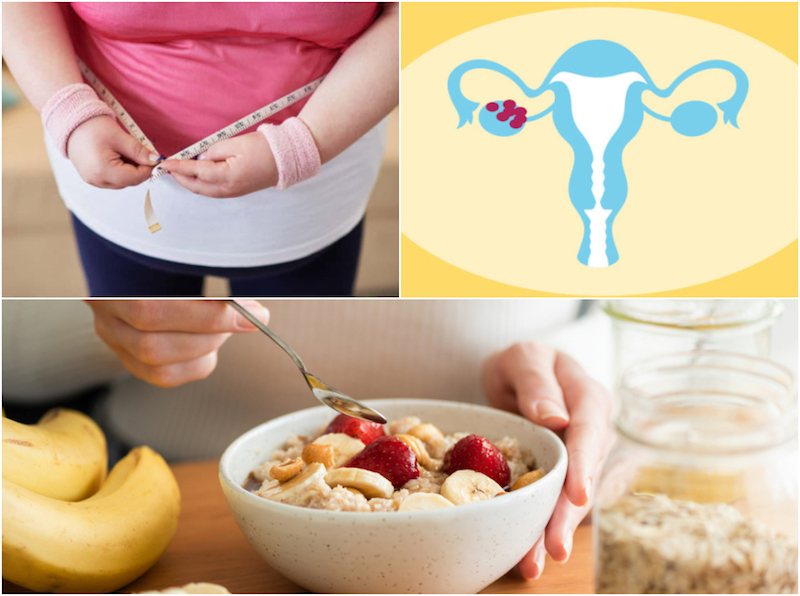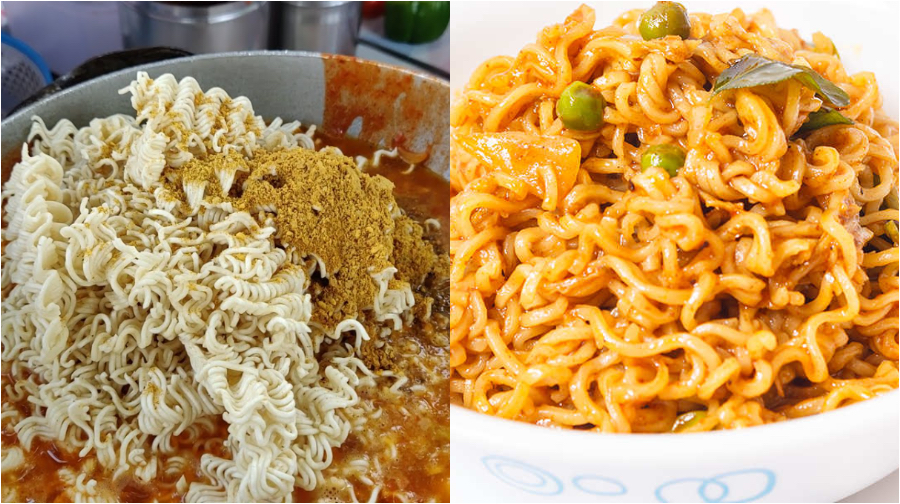Excessive facial hair growth, irregular periods, hair fall, acne – these are some common symptoms women with PCOD often suffer from, and adding to their woes – they seem to gain weight rather quickly. Polycystic ovarian disease or polycystic ovarian syndrome is a hormonal disorder that is quite common in women of reproductive age in the urban population. It has become a cause of worry because PCOD, as we have mentioned above, comes with a cluster of symptoms – acne, excessive facial growth, insulin resistance, menstrual irregularities to name a few. Often the first line of treatment that doctors and health practitioners often recommend for PCOD patients is to lose weight, but it’s a fact that women with this condition find it a bit harder than others to do so, even by following textbook weight loss rules. Most of them confess that they do get demotivated when they see that their sincere efforts to get rid of extra pounds is not fetching any results and are left flustered and confused about what they are doing wrong or what they should be doing right. Come to think of it, there are a lot of benefits when you lower the body fat percentage, especially, with regards to PCOD, you get to alleviate symptoms associated with this disease as well. Since obesity throws hormones out of whack, losing weight helps to correct hormonal imbalances too. With so many good things that can happen with burning up extra fat, it’s important to find out why PCOD makes it hard to lose weight and find effective strategies to override them. Read on for more details:


What’s PCOD Actually?
PCOD/PCOS is an endocrine disorder where women of reproductive age have an imbalance of hormones including estrogen and testosterone. Irregular periods, excessive facial hair growth, obesity, prediabetic condition, increased male hormone levels (androgen), acne, infertility, and difficulty in losing weight are all common symptoms associated with this disorder. In this disease, one or both the ovaries become enlarged in size with multiple cysts that are filled with liquid sacs, full of developed ovum, leading to hormonal imbalance. This hormonal imbalance also prevents release of eggs from ovaries, leading to infertility.
Common Symptoms of PCOD:
1. Changes in menstrual cycle, delayed or irregular periods, or no periods at all.
2. Painful periods.
3. Skin problems like acne, hyperpigmentation, acanthosis nigricans.
4. Fatigue.
5. Difficulty in losing weight.
6. Excessive facial and body hair.
7. Stress/anxiety.
8. Infertility.

Why Does PCOD Makes it Hard To Lose Weight?
Since PCOD is an endocrine disorder, impaired functioning of several hormones combined with lifestyle factors and wrong dietary practices make weight loss an uphill task. Let’s detail them out one by one.
1. Insulin resistance: Women with PCOS have higher levels of insulin than normal. Insulin is a hormone which not only regulates blood sugar, it also encourages the body to store more fat instead of burning it up. The extra insulin circulating in the blood makes sure that you are always hungry, craving for more food, tired, and of course, most calories that are consumed get stored as fat and not much is used to generate energy. Too much insulin in the blood suppresses fat burning and promote lipogenesis. Coming to insulin resistance, it’s the condition where pancreas produces insulin but the cells stop responding to the efforts of this hormone by not allowing glucose to enter from the bloodstream. As a result, there’s an excess of glucose always circulation in the blood, and to get excess blood sugar out of the way, pancreas continue to secrete more insulin. When you tend to eat a large amount of refined carbohydrates, especially refined flour (maida, pastas/cookies etc.) or sugary substances (pastries/cakes/cold drinks), it triggers release of insulin from the pancreas, and over a period of time, the cells become insulin resistant, making losing weight extremely difficult. Read about some amazing ways to fight insulin resistance in this post.
2. Too Much White Sugar/Added Sugar: Now that we have established that insulin is a fat-storage hormone, consumption of too much sugar and products with added sugar trigger insulin release, and when that happens often, the cells in the body eventually become resistant to insulin, and as a result, more insulin is pumped out, leading to insulin resistance Cutting out white sugar and added sugar will help lower insulin resistance and would make losing weight easy.
3. Magnesium Deficiency: Magnesium is an essential mineral whose deficiency can cause insulin resistance, so make sure you are getting enough magnesium in your diet from foods such as beans, almonds, cashews, spinach, okra, peanut butter, tofu, black-eyed beans, chickpeas, etc.
4. High Levels of Androgen: Women with PCOD have been found to have higher than normal levels of the male hormone androgen. Abnormal levels of androgen have been linked to weight gain around the tummy area.
5. Chronic Inflammation: When someone leads an extremely stressful life, eats processed food, compromises on quality sleep, a protein called as C-reactive protein, which is considered to be an inflammatory marker present in the blood also rises up, making the body more and more acidic. Metabolic changes and hormonal factors raise CRP levels and push the body into inflammation status. Inflammation makes the body insulin resistant, and as a result, pancreas continuously pumps up insulin to lower blood sugar levels. Now, we all know that insulin is also a fat-storage hormone which triggers the creation of new fat cells. So, inflammation triggers insulin resistance, which in turn leads to more insulin production, and larger creation of fat cells which converts all extra calories into fat, and stores it particularly around the belly area. But fret not, lowering stress, eating plenty of leafy green vegetables, having healthy fats from nuts such as almonds, walnuts, including a good portion of fruits in daily diet, and of course exercising will help lower inflammation.
6. Sluggish Metabolism: PCOD condition affects metabolism and makes it sluggish, and here are “12 Ways to Boost Metabolism To Burn Fat.”
7. Leptin resistance: Leptin is the satiety or fullness hormone that sends signal to the brain that you are “full” and have had enough food. Leptin and ghrelin (hunger hormone) usually work in unity, maintaining an optimum balance, ghrelin rising only when there is a need to replenish energy and leptin signalling when there’s enough calories and energy in the body. However, in PCOD, leptin function gets impaired, leptin fails to send signal to the brain, and the body tends to stock on calories, uncertain of when to stop eating. Leptin resistance can also slow down your metabolism and increase ghrelin levels. All these factors not only prevents weight loss, they can make you gain weight. When a person is leptin resistant, it becomes very difficult to lose weight because the body is always in a state of hunger and does not realize that it has enough energy in the system. Here are some “Amazing Ways To Boost Leptin Hormone For Weight Loss.”
8. Stress: Everybody is leading a stressful life nowadays, but women with PCOD should realize that stress triggers cravings for unhealthy food, promotes weight gain, and can prevent weight loss. If you are under chronic stress, belly fat is a given! Stress can not only rob your energy, happiness, and good mood, it has an equal and bigger role in weight gain. High levels of cortisol will lead to increased cravings and emotional eating, bigger appetite, disruption of sleep – all adding up and building up of extra fat in the body. So, it’s imperative that you indulge in stress-busting techniques – yoga, music, a new hobby, exercise, whatever it takes to fight stress to shed extra pounds.
9. Toxic Obesogens Around: Unhealthy eating habits and sedentary lifestyle are largely blamed for weight gain and obesity; however, “obesogens” in the environment and all around us, even inside our homes, act as endocrine disruptors, hamper hormonal functions, and encourage body to store fat, leading to weight gain. BPA-laden plastic products, products with phthalates, MSG (monosodium glutamate), microplastics, and even house dust act as obesogens, and therefore it’s important to eliminate them from your surroundings.
10. Sleep Deprivation: This is very important for everyone and especially for those with PCOD. When you sleep for less than 7 hours, ghrelin hormone level increases which gives hunger signal even when you are not hungry. Also, insulin and cortisol hormones shoot up – both of which make it difficult to lose weight. Sleep for 8 hours everyday no matter what and you will see a drastic change in your body and overall health as well.
11. Sedentary Lifestyle: Fatigue is a common complaint in women with PCOD and sedentary lifestyle makes sure all the extra calories are getting stored as fat. Exercise helps a great deal to improve endurance, mood, and of course burn calories. Make exercise a part of your daily routine, and you can thank us later for this piece of advice.
Since there is no specific cure for PCOD, dietary changes and exercise are known to greatly benefit women suffering from this syndrome. Since diet plays an important role is treating PCOD, it would be prudent enough to make a list of items that flare up situation and eliminate them completely from your diet. Dairy products is one category of food items that have become quite controversial in PCOD condition along with refined carbs, sugar etc. Also, we shou not overlook the importance diet plays in management of this condition and that’s a weight loss diet program like Rati Beauty diet helps you to lose weight the healthy way, without compromising on nutrition. When you priortize diet and straighten up eating habits, it’s not only possible to lose weight, food acts as a medicine and helps alleviate PCOD related symptoms as well. Download the Rati Beauty app for more details.
How Insulin Makes you Fat and Prevents Weight Loss
12 Ways to Boost Metabolism To Burn Fat





![Samosas_During_Weight_Loss_Journey[1]](https://makeupandbeauty.com/wp-content/uploads/2023/12/Samosas_During_Weight_Loss_Journey1.png)